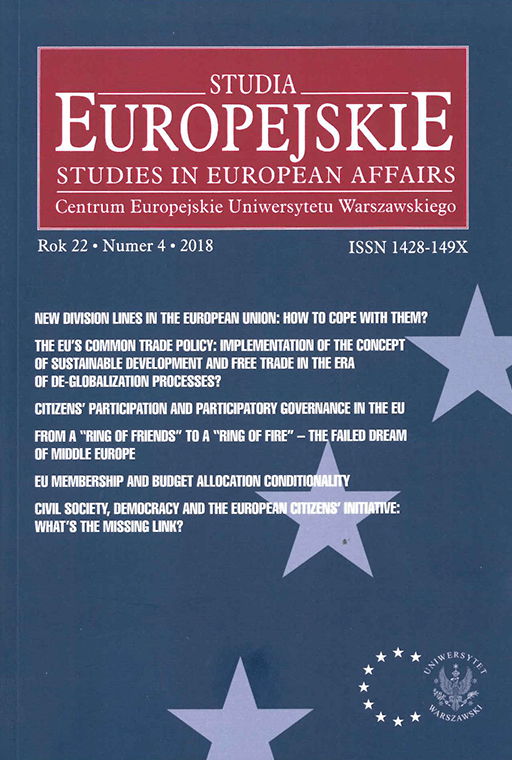
ISSUE: 4/2018
- Volume 22
- Number 4
- 2018
Subscribe NEWSLETTER
Studia Europejskie –
Studies in European Affairs
ISSN: 1428-149X
e-ISSN: 2719-3780
License
Articles published in the journal are under a Creative Commons Attribution – Non Commercial – No Derivatives 4.0 International License
EU Budget Challenged by the Present Migration and Refugee Crises – External Dimension of Actions
Abstract
The present migration and refugee crises in Europe required not only operational and legal EU responses but also budgetary ones. Additionally, the EU has resorted to use funds allocated to external action for migration purposes much more extensively than ever. This has turned the authors’ attention to the external dimension of the EU migration and asylum budget. In a spirit of emergency accompanied with the urgent search for flexibility the following budgetary measures on the external side were proposed: two trust funds: the EU Emergency Trust Fund for Africa and Regional Trust Fund in Response to the Syrian Crisis along with the EU Facility for Refugees in Turkey. These actions had serious budgetary consequences since they resulted in establishment of new financial solutions and hence caused budget reorganisation, refocus and reprioritisation. The new external developments have not only introduced cash pooling but also diminished the role of the European Parliament at the expense of the European Commission’s one. Such an approach may have far-reaching consequences for the EU as it conveys new flexibility, limits the role of the long-term programming and redefines the relationship between the EU and third countries.
References
Agreement establishing the European Union Regional Trust Fund in Response to the Syrian Crisis, ‘the Madad Fund’, and its internal rules, European Commission 2016.
Castillejo C., The European Union Trust Fund for Africa: A Glimpse of the Future for EU Development Cooperation, “Discussion Paper”, no. 22/2016.
Cipriani G., Financing the EU Budget, London 2014.
D’Alfonso A., How the EU budget is fi nanced The “own resources” system and the debate on its reform, European Union 2014.
D’Alfonso A., Immenkamp B., Briefi ng: EU Trust Funds for external action, First uses of a new tool, 2015, http://www.europarl.europa.eu/RegData/etudes/BRIE/2015/572797/EPRS_BRI(2015)572797_EN.pdf.
Decision (EC) on the Facility for Refugees in Turkey amending Commission Decision, C 92015 9500 of 24 November 2015,OJ 2016 C 60/03.
den Hertog L., EU budgetary Responses to the ‘Refugee Crisis’ reconfiguring the Funding Landscape, “Liberty and Security in Europe”, no. 93/2016.
Communication from the Commission to the European Parliament, the Council, the European economic and Social Committee and the Committee of the Regions, A European Agenda on Migration, European Commission, COM(2015) 240 fi al.
Communication from the Commission to the European Parliament and the Council, First Annual Report on the Facility for Refugees in Turkey, European Commission, COM(2017) 130 final.
EU Regional Trust Fund in response to the Syrian Crisis, 2016, https://ec.europa.eu/neighbourhood-enlargement/neighbourhood/countries/
syria/madad_en European Commission.
European Union Public Finance, 5th Edition, European Commission, Luxembourg 2014.
Factsheet on the EU Facility for Refugees in Turkey, European Commission,
https://ec.europa.eu/neighbourhood-enlargement/sites/near/fi les/frit_factsheet.pdf.
Factsheet on the EU Regional Trust Fund in response to the Syrian Crisis, European Commission, https://ec.europa.eu/europeaid/sites/devco/fi les/eu-emergency-trust-fund-africa-20171124-3_en.pdf.
Factsheet on the EU Trust Fund for Africa, European Commission, https://ec.europa.eu/europeaid/sites/devco/fi les/eu-emergency-trust-fund-africa-20171218_en.pdf.
Report from the Commission to the European Parliament, the European Council and the Council, Progress report on the European Agenda on Migration, European Commission, COM(2017) 669 final.
Report (2015/2341(INI)) on the EU Trust Fund for Africa: the implications for development and humanitarian aid, 2016, European Parliament,
http://www.europarl.europa.eu/sides/getDoc.do?pubRef=-//EP//NONSGML+REPORT+A8-2016-0221+0+DOC+PDF+V0//EN.
Global Health Advocates, Misplaced Trust: diverting EU Aid to Stop Migration, The EU Emergency Trust Fund for Africa, http://www.ghadvocates.
eu/wp-content/uploads/2017/09/Misplaced-Trust_FINAL-VERSION.pdf.
Haferlach L., Kurban D., Lessons Learnt from the EU-Turkey Refugee Agreement in Guiding EU Migration Partnerships with Origin and Transit Countries, “Global Policy”, vol. 8, sup. 4/2017. http://www.consilium.europa.eu/pl/policies/multiannual-fi nancial-framework/mff-2014-2020/.
Kervyn E., Shilhav R., Briefi ng note. An emergency for whom? The EU Emergency Trust Fund for Africa – migratory routes and development aid in Africa, Oxford 2017.
Nye J.S., The Future of Power, New York 2011.
Proczek M., Janczak, M., Przegląd budżetu ogólnego WE – stanowisko Polski , in: Gospodarka Polski w Unii Europejskiej. Wybrane zagadnienia, eds. H. Bąk, G. Wojtkowska-Łodej, Warszawa 2009.
Regulation (EU, EURATOM) no. 966/2012 of the European Parliament and of the Council on the financial rules applicable to the general budget of the Union and repealing Council Regulation (EC, Euratom) no. 1605/2002, OJ 2012 L 298/1.
Reno T., The EU Facility for Refugees in Turkey – Prevailing Misperception vs. Actual State of Play, 2017, http://www.iris-france.org/wp-content/
uploads/2017/09/Obs-Turkey-TReno-21-sept-2017.pdf.
Resolution (EP) of 13 June 2012 on the Multiannual Financial Framework and own resources, P7_TA(2012)02452012.
Rewizorski M., Poza „kompleksową współzależność” – w poszukiwaniu nowych rozwiązań dla starych problemów, in: Globalne zarządzanie i jego aktorzy, ed. M. Rewizorski, Warszawa 2016
Treaty of Lisbon (TL) amending the Treaty on European Union and the Treaty Establishing the European Community, OJ 2007 C306.
Language: English
Pages: 183-197
How to Cite:
Harvard
Proczek, M. and Osuch-Rak, E. and Surała, J. (2018) "EU Budget Challenged by the Present Migration and Refugee Crises – External Dimension of Actions". Studia Europejskie – Studies in European Affairs, 4/2018, pp. 183-197.